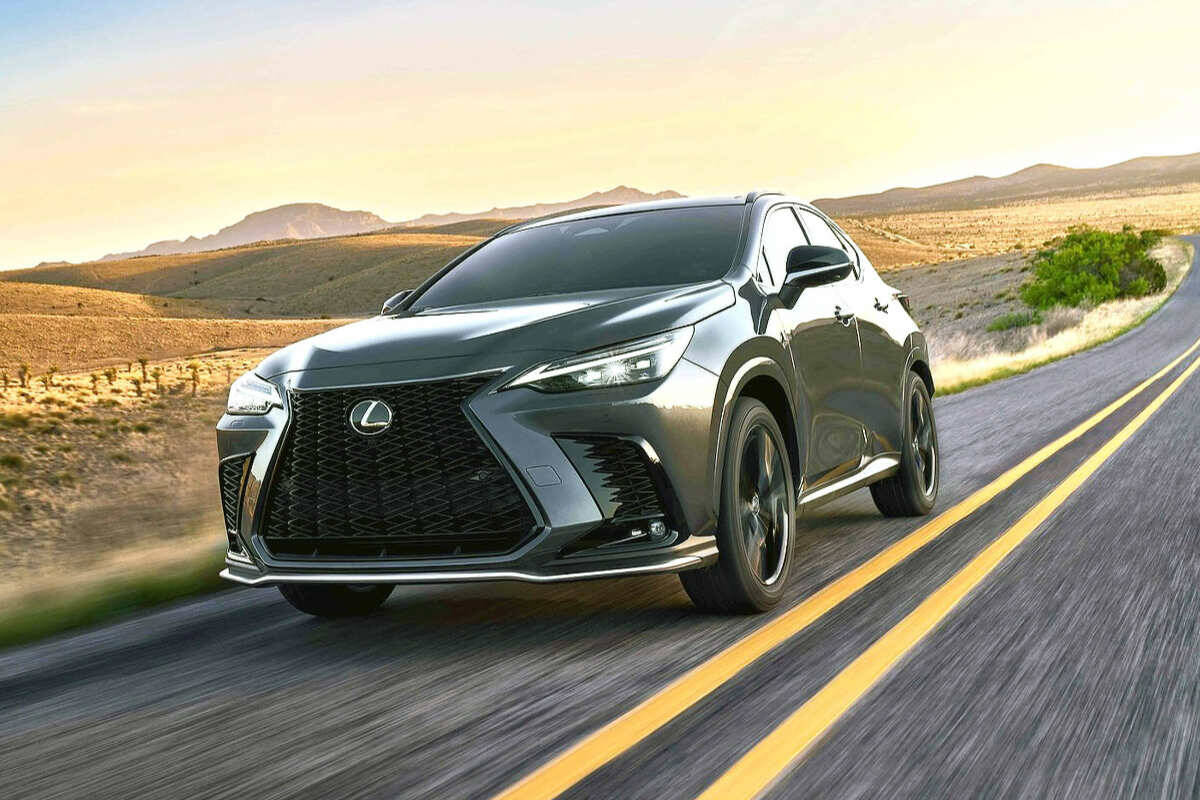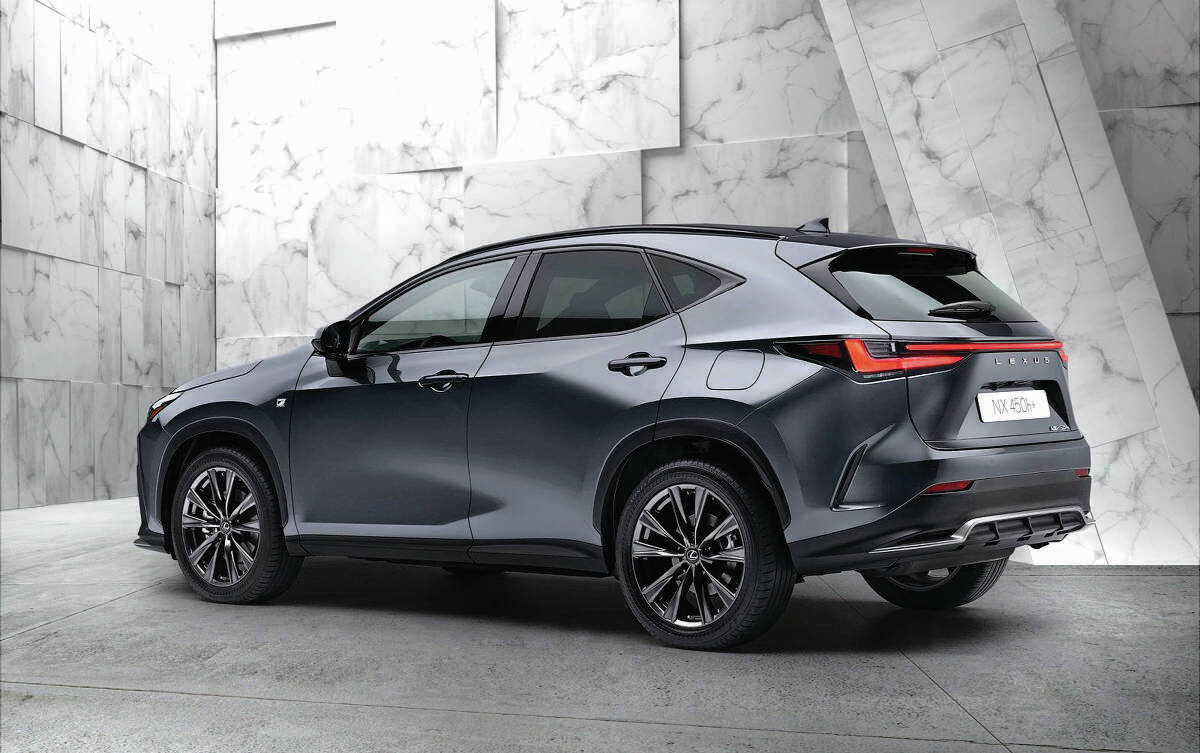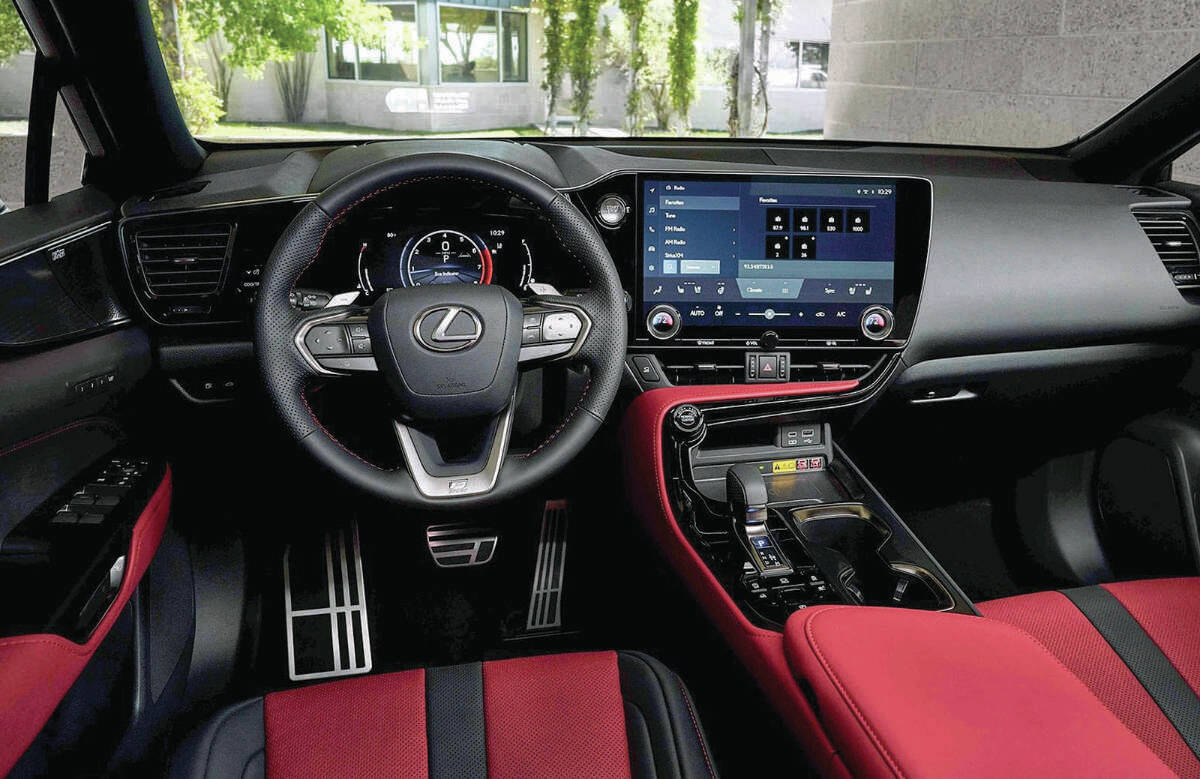You might not be able to tell by looking at it, but the NX is classified by Lexus as an “all-new” model for 2022. That doesn’t mean it looks all that different from the 2021 version because it clearly doesn’t. But all things considered, the description is mostly correct.
Among the quintet of tall wagons (a.k.a. utility vehicles and crossovers) from the upscale Toyota brand, the NX slots between the smaller UX and the larger midsize RX. The still-larger GX and LX round out the group.
Each of the five shows off Lexus’s ubiquitous spindle-shaped grille, with the NX’s version being more dominant than before. Lexus also reshaped the body panels, added a greater degree of rake (a steeper angle) to the windshield for improved aerodynamics, and also raised the roofline in back. This could explain why cargo capacity behind the rear has grown by more than 25 per cent, even though total stowage volume with the rear-seat folded has actually decreased by about 15 per cent. There’s a bit more rear legroom, too.
Dimensionally, both old and new NXs vary only slightly. Note that the NX uses the same architecture as the Toyota RAV4 and is similar in size to that model.
The updated dashboard includes a 7-inch high-definition display for the driver and a 9.8- or available 14-inch touch-screen for the infotainment, climate control and navigation systems. The shift lever has also been replaced by a less intrusive rocker-style lever.
For 2022, there are four NX models, up from two, each with its own powertrain. The base NX 250 comes with all-wheel-drive and a 2.5-litre four-cylinder with 203 horsepower and 184 pound-feet of torque. All-wheel-drive is also standard fare for the NX 350, which gets a turbocharged 2.4-litre four-cylinder rated at 275 horsepower and 317 pound-feet.
The NX 350h AWD hybrid delivers 239 horsepower using a 2.5-litre four-cylinder assisted by front and rear electric motors. The top-level NX 450h+ plug-in hybrid AWD also uses the 2.5, but output jumps to 302 horsepower. Lexus claims a maximum range of ahout 60 kilometres on battery power alone.
An eight-speed automatic transmission is linked to the NX 250 and NX 350. A continuously variable unit (CVT) gets the call for the two hybrids.
According to Lexus, the plug-in can accelerate to 96 km/h (60 mph) from rest in six seconds, which is 1.2 seconds quicker than the NX 350h. As you would expect, the NX 350 is the quickest of the gasoline models at 6.6 seconds.
The NX 250 earns 8.4 l/100 km for combined city/highway driving, while the NX 350h is rated at 6.0 l/100 km, combined. On electric power, the NX 450h+ earns the equivalent of 2.8 l/100 km, combined.
The front-wheel-drive NX 250 starts at $49,500, including destination charges. Base equipment includes a 9.8-inch touch-screen, heated and power-adjustable front seats, 10-speaker audio system and 18-inch wheels. Also standard is a navigation system that can provide over-the-air mapping updates.
Active-safety highlights include blind-spot warning with cross-traffic backup alert, automatic collision avoidance/braking and right-turn pedestrian detection/braking.
Depending on the model, additional content includes a panoramic moonroof, a head-up display, wireless phone charging, 17-speaker Mark Levinson Sound package, heated rear seats and ambient interior lighting with 64 colour choices.
Among the option packages, the F Sport is available for the NX 350 and NX 450+. It includes a continuously variable suspension with performance shock absorbers, well-bolstered sport seats, distinctive grille and 20-inch gloss-black wheels. There’s no additional horsepower, however.
The Lexus NX series resides within a group that encompasses the BMW X1 and X2, the Mercedes-Benz GLA-and GLB-Class, the Acura RDX and the Cadillac XT4. But with a wealth of available performance and content variations, the NX offers a significantly wider range of customization that any of its direct competitors. That fact alone makes it worthy of consideration.
What could really tip the scales is the perception that the hybrid powertrains make the NX more advanced and also more thrifty at the pumps as fuel prices continue to climb.
What you should know: 2022 Lexus NX
Type: All-wheel-drive compact utility vehicle
Engines (h.p.): 2.5-litre I-4 (203); 2.4-litre I-4, turbocharged (275); 2.5-litre I-4 with electric motors (239/302)
Transmissions: Eight-speed (automatic); continuously variable (hybrid)
Market position: The NX is in a group of tough compact tall-wagon competitors, but separates itself with more powertrain offerings, including two hybrid models.
Points: Styling is similar to the outgoing model, although all body panels have been redesigned. • Increased stowage volume behind the rear seat, but reduced capacity when it’s folded flat. • Four powertrain choices give buyers plenty of options. • Plug-in hybrid model is the quickest and the most fuel-efficient.
Active safety: Blind-spot warning with cross-traffic backup alert (std.); active cruise control (std.); front and rear emergency braking (std.); inattentive-driver alert (std.); lane-departure warning (std.); pedestrian/cyclist warning (std.)
L/100 km (city/hwy): 9.4/7.4 (2.5)
Base price (incl. destination): $49,500
BY COMPARISON
BMW X2
- Base price: $45,900
- Affordable and sporty model offers 228 or 301 h.p. from a turbo 2.0.
Mercedes-Benz GLA
- Base price: $45,600
- Available with a choice of three turbo I-4 engines making up to 382 h.p.
Audi Q3
- Base price: $41,350
- Turbo 2.0-litre I-4 makes 184 or 228 h.p. AWD is standard.
– written by Malcom Gunn, Managing Partner at Wheelbase Media
If you’re interested in new or used vehicles, be sure to visit TodaysDrive.com to find your dream car today! Like us on Facebook and follow us on Instagram



